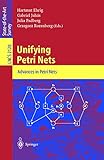Unifying Petri Nets [electronic resource] : Advances in Petri Nets / edited by Hartmut Ehrig, Julia Padberg, Gabriel Juhás, Grzegorz Rozenberg.
Material type: TextSeries: Lecture Notes in Computer Science ; 2128Publisher: Berlin, Heidelberg : Springer Berlin Heidelberg, 2001Description: VIII, 488 p. online resourceContent type: text Media type: computer Carrier type: online resourceISBN: 9783540455417Subject(s): Computer science | Computer Communication Networks | Software engineering | Logic design | Computational complexity | Computer Science | Computation by Abstract Devices | Software Engineering/Programming and Operating Systems | Logics and Meanings of Programs | Computer Communication Networks | Discrete Mathematics in Computer ScienceAdditional physical formats: Printed edition:: No titleDDC classification: 004.0151 LOC classification: QA75.5-76.95Online resources: Click here to access online
TextSeries: Lecture Notes in Computer Science ; 2128Publisher: Berlin, Heidelberg : Springer Berlin Heidelberg, 2001Description: VIII, 488 p. online resourceContent type: text Media type: computer Carrier type: online resourceISBN: 9783540455417Subject(s): Computer science | Computer Communication Networks | Software engineering | Logic design | Computational complexity | Computer Science | Computation by Abstract Devices | Software Engineering/Programming and Operating Systems | Logics and Meanings of Programs | Computer Communication Networks | Discrete Mathematics in Computer ScienceAdditional physical formats: Printed edition:: No titleDDC classification: 004.0151 LOC classification: QA75.5-76.95Online resources: Click here to access online  E-BOOKS
E-BOOKS
| Current library | Home library | Call number | Materials specified | URL | Status | Date due | Barcode |
|---|---|---|---|---|---|---|---|
| IMSc Library | IMSc Library | Link to resource | Available | EBK5438 |
“What Is a Petri Net?” Informal Answers for the Informed Reader -- Application Oriented Approaches -- The ?Petri Net Baukasten?: An Overview -- Improving the Usability of Petri Nets with the ?Petri Net Baukasten? -- Implementation of Parameterized Net Classes with the Petri Net Kernel of the ?Petrinetz-Baukasten? -- Process Landscaping: Modelling Distributed Processes and Proving Properties of Distributed Process Models -- Unifying Frameworks -- Petri Nets over Partial Algebra -- Parameterized Net Classes: A Uniform Approach to Petri Net Classes -- Behavior and Realization Construction for Petri Nets Based on Free Monoid and Power Set Graphs -- Rewriting Logic as a Unifying Framework for Petri Nets -- Theoretical Approaches -- Generalized Automata and Their Net Representations -- On Concurrent Realization of Reactive Systems and Their Morphisms -- Transactions and Zero-Safe Nets -- Two Algebraic Process Semantics for Contextual Nets -- Continuous Petri Nets and Transition Systems.
Since their introduction nearly 40 years ago, research on Petri nets has diverged in many different directions. Various classes of Petri net, motivated either by theory or applications, with its own specific features and methods of analysis, have been proposed and studies in depth. These successful developments have led to a very heterogeneous landscape of diverse models, and this, in turn, has stimulated research on concepts and approaches that contribute to unifying and structuring the diverse landscape. This state-of-the-art survey presents the most relevant approaches to unifying Petri nets in a systematic and coherent way. The 14 chapters written by leading researchers are organized in topical sections on application-oriented approaches, unifying frameworks, and theoretical approaches.


There are no comments on this title.